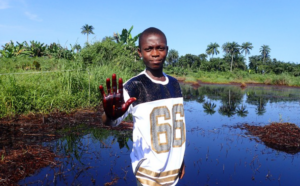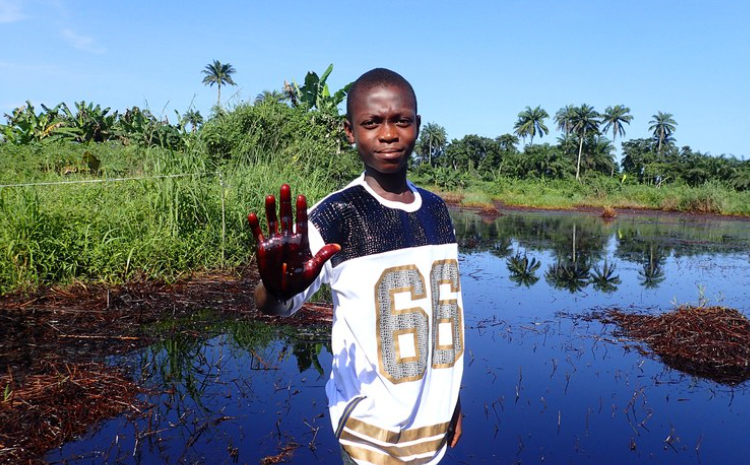
Why does the fight for justice take so long? Why is it so difficult to hold Big Oil to account? Why does it take years, or decades, to drag oil executives, kicking and screaming, into a court-room?
These are questions that have long, difficult convoluted answers. Often even getting an oil executive into court is a feat in itself.
For an industry that has contributed to decades of air and water pollution, climate change, human rights abuses, environmental atrocities, not to mention environmental racism and abuse towards First Nations, Indigenous, and front-line communities, it is surprisingly rare to see Big Oil held legally to account.
But it does happen. Hopefully 2020 will bring two significant environmental justice and human rights victories against the old corporate villain, Shell.
This year is the 25th Anniversary of the death of the Ogoni 9, including the writer, Ken Saro-Wiwa in Nigeria. We always maintained that Ken and the other members of the Ogoni were murdered by the military due to their campaign against Shell’s rampant pollution and environmental racism.
One year ago today, in a trial brought by four of the widows of the Ogoni 9, led by Esther Kiobel, we heard damning revelations from witnesses under oath that the company had bribed them to testify against Shell and the others.
The legal case would never have proceeded without the avid help of Amnesty International. That day in court, Amnesty researcher Mark Dummet live-tweeted about the witnesses’ damning revelations:
he claims that Shell left him 30,000 Naira
— Mark Dummett (@MarkDummett) October 8, 2019
Last month, after a long COVID delay, the court case resumed. Justice is slowly inching closer. Nearly a quarter of a century after her husband was murdered, the dogged Esther Kiobel remains determined as ever to have her husband’s name cleared. “This case will give a sense of belonging and hope to the countless victims of human rights abuses over the world,” she says.
She is not alone is pursuing Shell in the courts. Shell is not only at court over the murder of the Ogoni 9, but also for its rampant pollution in Nigeria too.
It is another case that has taken years come to resolve. Four Nigerian farmers are suing Shell for leaking pipelines on their land. Their case is being assisted by Milieudefensie (Friends of the Earth Netherlands). It was first logged in 2008.
It is unforgivable that the case has dragged on for so long, that two of the plaintiffs have died during the intervening years. Shell playing every devious legal trick in the book, tried to argue the case should not be heard in the Dutch courts. The oil giant tried to delay the legal action, just like it has delayed action on climate change.
The result of Shell’s legal tricks is that two plaintiffs never lived to see justice. But their children have taken on the case in their name. They now have the chance of seeing justice for their parents and seeing Shell found guilty.
And so the case grinds on. And today, a year to the day since we heard witnesses say they were bribed by Shell, the oil giant was back in the dock. Just like the Kiobel case, this one is ground-breaking. The surviving farmers and their relatives watched via video link from Nigeria.
Speaking before the hearing, one of the original plaintiffs, Chief Fidelis Oguru, said: “The land that contained our source of income had vanished. I hope that the Dutch court will give us a favorable judgement.”
A spokesperson for Milieudefensie added, “we demand that Shell compensate the residents, clean up its mess and prevent future leaks. We hope the judge agrees with us and decides that the residents deserve to be compensated. Only then can they start a new life.”
Shell could have settled out of court in both cases years ago. But it chose not to. As I wrote last year, “It is appalling that Shell has not tried to bring closure to the issue by admitting guilt, paying compensation and adequately and promptly cleaning up its toxic mess and legacy in the Niger Delta, and in particular in Ogoni.”
I continued, “but Shell is an arrogant indifferent beast, whose roots are embedded in the colonial exploitation of a country like Nigeria. Its staff are insulated from the real world by a corporate internal spin machine that propagates pro-Shell propaganda that the company is some kind of green pioneering company, not a corporate polluter or killer.”
The company chose to delay the pain and agony of the plaintiffs, but soon it will have run out of places to hide and excuses to make. It cannot hide from justice forever.
Saro-Wiwa wrote in his closing testimony at the trial of the Ogoni 9 that, “I and my colleagues are not the only ones on trial. Shell is here on trial and it is as well that it is represented by counsel said to be holding a watching brief. The Company has, indeed, ducked this particular trial, but its day will surely come… The crime of the Company’s dirty wars against the Ogoni people will also be punished.”
Today that day moved one step closer.

